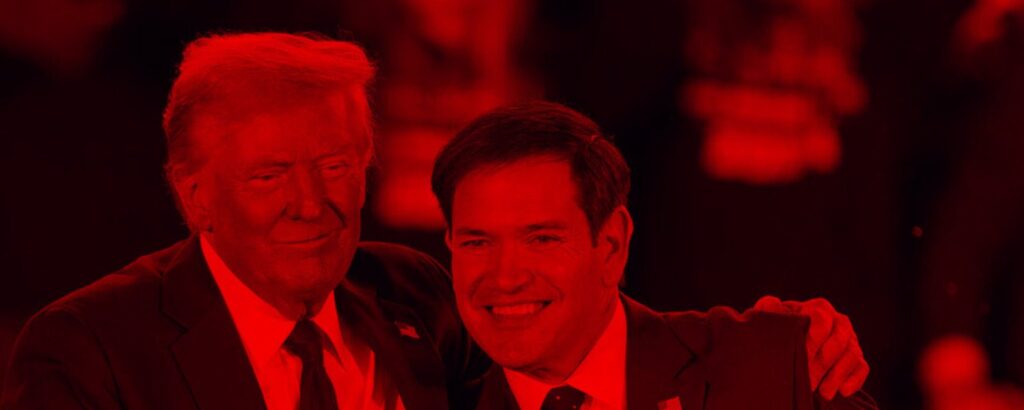
The New War Party Replaced the Old War Party
On the 2024 campaign trail, Donald Trump explained that his failure to fill his cabinet with capable and trustworthy advisors was due to his inability to navigate Washington. When Joe Rogan asked him about this, Trump cited John Bolton and John Kelly as examples of “bad people,” and called their appointments his “biggest mistake.”
In this same spirit, Trump recently went out of his way to blast neoconservative war hawks, including Liz Cheney, and focused on that topic in the final days of his campaign. Indeed, one of his primary pitches to skeptics was that he had learned his lesson when it came to surrounding himself with distrustful subordinates, and wouldn’t repeat the same mistakes.
But did he really?
In the early days after his election, Trump sent waves of jubilation across the dissident world when he confirmed Nikki Haley and Mike Pompeo would not be part of his next administration. However, this momentary cause for celebration quickly evaporated when he began to make key foreign policy appointments.
Most quizzically for Trump and his political allies, Rubio has been a committed supporter of Ukraine aid. One might take his vote against the $100 billion Ukraine aid package back in April as a sign he had changed his position, however he announced on the Senate floor that his opposition to the bill had nothing to do with any lack of interest in funding Ukraine, but instead for the bill’s failure to address immigration concerns.
Only in the last days of the 2024 campaign season did Rubio shift to recommending a negotiated settlement to end the war, a surefire indication he was vying for an administration appointment.
Another abominable foreign policy appointee is Mike Waltz, Trump’s incoming National Security Advisor. A Florida Congressman, Waltz recently argued that when it came to Iran, the US government must “punch them in the nose.”
Beyond being a true banner-waver of the Israel First mentality, Waltz is also a staunch supporter of Ukraine aid. “Putin will only stop when he meets cold hard steel and military might,” Waltz said in 2022. “We must support Zelenskyy in an effort to win and drive Russia completely out of Ukraine.”
Waltz also supports creating a new proxy war with China over Taiwan, and claimed the US is currently engaged in “A Cold War” with the country. Additionally, he proposed restarting the war in Afghanistan and using the country as a base to confront China.
If all of that wasn’t enough, he voted against ending all US involvement in the Yemeni Civil War, supported renewing the Authorization of Military Force for Iraq in 2021, and applauded Trump for bombing Russian forces in Syria. But what else should we have expected from Dick Cheney’s former “counterterrorism” adviser?
Trump’s new choice for UN Ambassador, Elise Stefanik, has long been a pro-war fanatic. Once on George W. Bush’s staff, she has routinely complained that the Biden administration hasn’t armed Ukraine and Israel enough, and purported that Putin invaded Ukraine because the US government wasn’t antagonistic enough toward Russia.
Earlier this year, Stefanik campaigned for giving Israel “what it needs, when it needs it, without conditions,” and grilled college presidents in a House committee hearing for not cracking down on the free speech rights of campus demonstrators.
Secretary of Defense appointee Pete Hegseth, who has a long past as a neocon, criticized Biden for not arming Ukraine quickly enough, and accused Putin of trying to recreate the Soviet Union. Hegseth has recently supported Defend the Guard legislation, which he should get immense credit for, but he seems only to have walked back some of pro-war positions in the very recent past. It’s fair to call him the biggest wild card of the bunch.
New Ambassador to Israel Mike Huckabee denies Israel’s occupation of the West Bank, and even refuses to say that the West Bank exists. New CIA Director John Ratcliffe, also an Iran and China hawk, played a key role in the extension of FISA Section 702, a program that enables the warrantless wiretapping of Americans. He also criticized Biden for imposing harsher sanctions on Russia and not arming Ukraine quickly enough.
Dissidents should never have expected a cabinet full of anti-Zionists or Ron Paul-style noninterventionists, but the reasonable inference from Trump’s campaign was that people with views closer to the populist right—especially on Ukraine—would displace Biden’s old pro-Zelenskyy regime. That simply has not happened. Alas, the blue-colored war party has simply been replaced by the red-colored alternative.
As prominent libertarian Tom Woods pointed out, Trump’s appointments show where the lines of acceptability were drawn. The president-elect was able to get many of the people he campaigned with into key domestic positions, such as Tulsi Gabbard, Matt Gaetz, and Robert F. Kennedy Jr., but his foreign policy picks have been a who’s who of Washington insiders and war hawks.
Trump has officially rejected the anti-empire, anti-neocon mandate of the American electorate, and it does not bode well for resolving any of America’s active wars. If a peace settlement between Russia and Ukraine is to be reached—as Trump promised on the campaign trail—it may have to be orchestrated by the president himself.

Dave Benner is the author of “Thomas Paine: A Lifetime of Radicalism” and “Compact of the Republic: The League of States and the Constitution”. He contributes articles to the Mises Institute, Tenth Amendment Center, and Dissident Media.
<a href=“https://substack.com/@dbenner” target=“_blank”> <img src=“https://upload.wikimedia.org/wikipedia/commons/4/42/Substack_logo.png” alt=“Substack” width=“24”> </a> <a href=“https://www.tiktok.com/@dissidentpulse” target=“_blank”> <img src=“https://upload.wikimedia.org/wikipedia/commons/0/0a/TikTok_logo.png” alt=“TikTok” width=“24”> </a>






